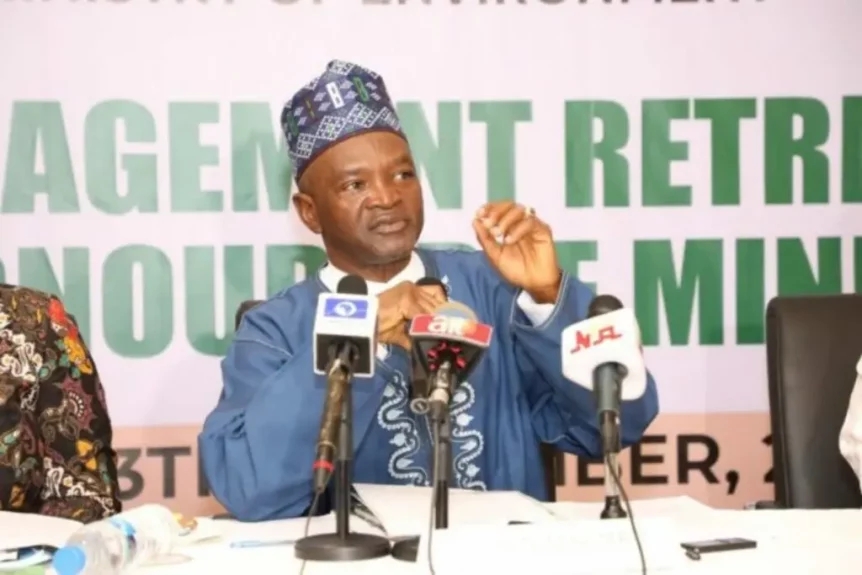According to the federal government, 56% of Nigeria’s arable land is underutilised.
During the ongoing 45th regular meeting of the National Council on Agriculture and Rural Development in Jos, Plateau State yesterday, the Minister of Agriculture and Rural Development, Dr. Mohammad Abubakar, stated, “Nigeria is endowed with a total of 79 million hectares of agricultural land, with only 44 percent being cultivated.” Additionally, the country has 267 billion cubic metres of fresh surface water and 58 billion cubic metres of underground water, with 37 billion cubic metres only stored in dams.
“The country’s annual rainfall ranges from 300mm to 4,000mm.” Conversely, potential irrigable area is approximately 3.14 million Hectares, with less than 7% currently utilised.”
He, however, said the government was doing all it could to encourage agriculture having trained 153,124 women and youths on various agricultural crop, fishery and livestock value chain and empowered 142,703, trained 214,787 farmers on Good Agricultural Practices (GAP) and 220,018 farmers on Farmer Business School (FBS).
The minister said, “recent reports from the National Bureau of Statistics indicates that the agricultural sector topped the chart in a survey of seven sectors identified to have contributed to the Nigeria economy in the second quarter of 2022.
“It out-performed six other sectors comprising Trade, Telecommunications, Manufacturing, Oil & Gas, Real Estate as well as Finance & Insurance. The chart revealed that Agriculture alone contributed 23.3 per cent to GDP (Half Year 2022).”
To improve its performance, the minister said the federal government was strengthening the linkage between research, agriculture and industry by intensifying commodity value chain development process.
“This is being guided by the new framework of the National Agricultural Technology and Innovation Policy (NATIP), 2022-2027, launched in August 2022, which seeks to modernise the agricultural sector in line with changing global food systems and supply chains.
“Actually, NATIP is the Ministry’s response to the present Administration Agenda of diversifying the nation’s economy from petroleum oil-based to Agriculture and solid minerals.
Read Also: NATFORCE operations illegal, says security Council
“The document serves as successor policy of the Agricultural Promotion Policy (APP), 2016-2020, with a view to developing priority value chains on the basis of comparative ecological advantage across crops, livestock and fisheries sub-sectors in collaboration with the States Government.
“In pursuant of our mandate of ensuring food security, employment generation and wealth creation in the country, the Ministry is committed to supporting the establishment of over 100 processing centres in the rural communities across the nation under the Green Imperative Project of a private-driven mechanization programme.”
Abubakar said the Ministry hopes to vigorously develop clusters, rural nodal centres and rural cottage industries, as well as establish six Special Agro-industrial Processing Zones (SAPZ) nationwide.
“As an impetus, Mr. President has approved an intervention fund for the completion of the 10 Nos large-scale rice mills with a combined minimum capacity of 320 MT per day in 10 states. The Mills are located in Jigawa, Kano, Adamawa, Niger, Kaduna, Gombe, Ekiti, Ogun, Bayelsa and Federal Capita Territorry (FCT).”
Also speaking, Minister of State for Agriculture, Hon. Mustapha Shehuri said he was confident that given the level of cooperation and partnership amongst the Ministry’s state and non-state actors, and with the application of appropriate technologies, the goals of achieving food security, diversifying the economy for agribusiness undertakings and growing the GDP would be achieved.
In his remark, the Governor of the state, Mr. Simon Lalong, who thanked the minister for giving the state attention and support in the process of implementing the National Livestock Transformation Programme (NLTP), added that the, “NLTP is so dear to us because it contains strategies that will tackle the farmer-herder clashes occasioned by unending crisis that has brought pains and retrogression in the state. As one of the pilot States, we are optimistic that the programme will bring economic prosperity to our people.”
He said over the last seven years, the state had given enormous attention to agriculture by ensuring the provision of farm inputs such as tractors, fertilizers, chemicals, improved seedlings and many more towards ensuring that our people benefit from the natural endowments of the state.


